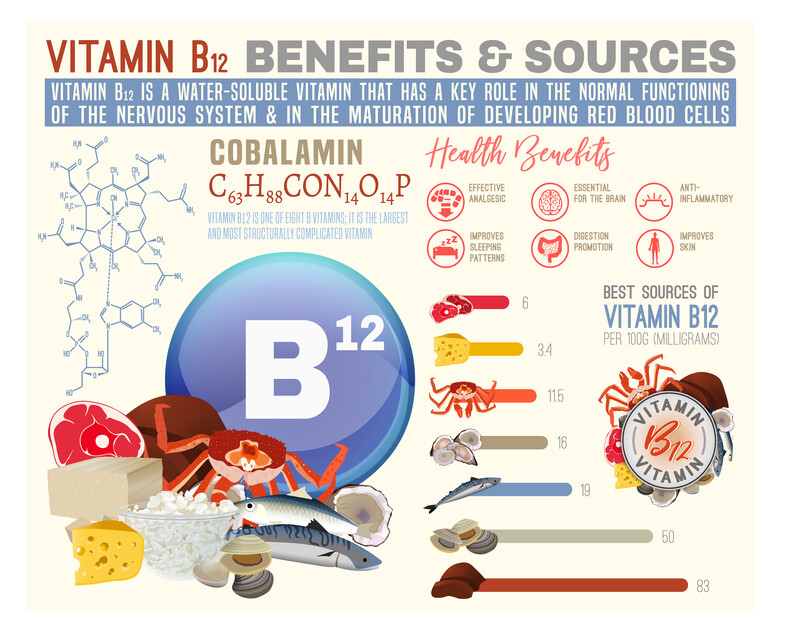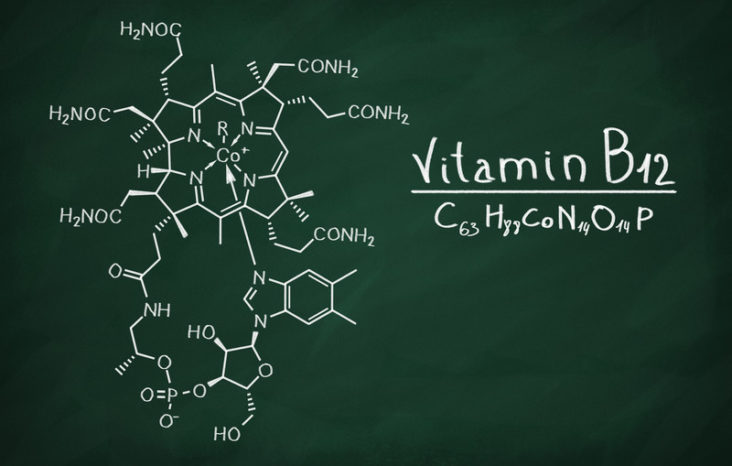Vitamin B12 (cobalamin) is a water-soluble vitamin that plays essential roles in red blood cell formation, cell/energy metabolism, nervous system function and the production of DNA.
Vitamin B12 is an elaborate molecular jigsaw involving around 30 individual components. It is unique among the vitamins in that it is only made by certain bacteria, but the majority of the bacteria in our GI tract lives at the end of our digestive tract, after the point at which B12 gets absorbed.
It is therefore considered an “essential nutrient” because your body is unable to produce it on its own and needs to obtain it from food sources or supplementation.
Vitamin B12 works together with folate (vit.B9) in the synthesis of DNA and red blood cells. It’s also involved in the production of the myelin sheath around the nerves and the conduction of nerve impulses. You can think of the brain and the nervous system as a big tangle of wires. Myelin is the insulation that protects those wires and helps them to conduct messages.
Plants do not contain any vitamin B12, so individuals that don’t eat many (or any) animal products should pay special attention to their intake. This, alongside with Zinc and Iron.
B12 is the only vitamin that contains a trace element (cobalt), which is why it’s called cobalamin. Cobalamin is produced in the gut of animals. It’s the only vitamin we can’t obtain from plants or sunlight. Plants don’t need B12, so they don’t store it.

Symptoms of deficiency?
Here are some of the most common vitamin B12 deficiency symptoms:
o Tingling or numbness in the hands and feet
o Brain fog, confusion, and memory problems
o Depression
o Premature aging
o Cognitive decline
o Anemia
o Weakness
o Fatigue
o Reduced appetite and weight loss
o Constipation
o Trouble balancing
Vitamin B12 has a very complex digestion and absorption pathway. Its digestion is dependent on specific gastric juice components, including gastric acids and a compound (protein) called intrinsic factor. Our digestive tract releases less of these gastric acids as we age, and heavy use of antacids can also interfere with this step of digestion. The excretion of intrinsic factor also decreases with age, putting the elderly at increased risk for deficiency.
Technically, vitamin B12 is categorized as a water-soluble vitamin along with the other B vitamins and vitamin C. Excess water-soluble vitamins are not stored in the body for later use, but eliminated daily. In contrast, excess fat-soluble vitamins A, D, E, and K are stored in the adipose (fat) tissue indefinitely until they are either used or fat is lost via weight loss. Interestingly, vitamin B12 falls somewhere in between a water-soluble and fat-soluble vitamin in terms of storage length. Once absorbed, B12 is integrated into bile, a digestive juice that allows for the digestion of fat. Bile is very efficiently recycled via enterohepatic circulation, with about 95% of bile returning to the liver for storage and reuse. As a part of bile recycling, vitamin B12 can remain in the body for roughly one year.

Why Is B12 Deficiency So Common?
The absorption of B12 is complex and involves several steps—any of which can go wrong. Any of the following can cause B12 malabsorption:
Intestinal dysbiosis
Leaky gut and gut inflammation
Atrophic gastritis or hypochlorhydria (low stomach acid)
Pernicious anemia
Medications, especially proton pump inhibitors (PPIs) and other acid-suppressing drugs
Alcohol
Exposure to nitrous oxide, during either surgery or recreational use
This explains why a deficiency can occur even in people eating large amounts of B12-containing animal products. Studies consistently demonstrate that up to 50 percent of long-term vegetarians and 80 percent of vegans are deficient in B12.
If you’re low on B12, try eating some vitamin-rich foods like:
Liver
Shellfish
Clams
Oysters
Organ Meats
Eating other kinds of seafood, like octopus, fish eggs, lobster, and crab, can also help you attain normal B12 levels. If you’re seafood-averse, you can also get this vitamin from:
• Lamb
• Beef
• Eggs
• Cheese

Side effects?
Some of the most common vitamin B12 shot side effects include:
o Headache
o Dizziness
o Rash
o Itchy or burning skin
o Facial flushing
o Skin redness
o Cold symptoms
o Anxiety
o Swelling
o Diarrhea
o Vomiting
o Numbness
o High blood pressure (immediately after injecting)
But these are rare. If you develop any of these side effects, you can stop taking the supplement and the symptoms should subside.

Here, at the clinic, we offer vit.B12 shots because injected intramuscularly (in the shoulder muscles – posterior deltoid), vitamin B12 is easily absorbed by the body, bypassing the liver.
